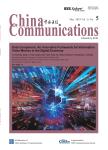Dynamic Uplink Transmission Scheduling for Satellite Internet of Things Applications
Dynamic Uplink Transmission Scheduling for Satellite Internet of Things Applications作者机构:Beijing University of Posts and TelecommunicationsBeijing 100876China China Academy of Information and Communications TechnologyBeijing 100191China Institute of Software Chinese Academy of SciencesBeijing 100190China
出 版 物:《China Communications》 (中国通信(英文版))
年 卷 期:2020年第17卷第10期
页 面:241-248页
核心收录:
学科分类:1305[艺术学-设计学(可授艺术学、工学学位)] 080904[工学-电磁场与微波技术] 0810[工学-信息与通信工程] 13[艺术学] 0809[工学-电子科学与技术(可授工学、理学学位)] 081104[工学-模式识别与智能系统] 08[工学] 0804[工学-仪器科学与技术] 080402[工学-测试计量技术及仪器] 081001[工学-通信与信息系统] 081101[工学-控制理论与控制工程] 0811[工学-控制科学与工程]
基 金:National High Technology Research and Development Program of China National Natural Science Foundation of China, NSFC
主 题:satellite IoT transmission scheduling resource allocation simulated annealing Monte Carlo
摘 要:Satellite communication systems provide a cost-effective solution for global internet of things(IoT)applications due to its large coverage and easy *** paper mainly focuses on Satellite networks system,in which low earth orbit(LEO)satellites network collect sensing data from the user terminals(UTs)and then forward the data to ground station through geostationary earth orbit(GEO)satellites *** the limited uplink transmission resources,this paper optimizes the uplink transmission scheduling scheme over LEO satellites.A novel transmission scheduling algorithm,which combined Algorithms of Simulated Annealing and Monte Carlo(SA-MC),is proposed to achieve the dynamic optimal scheduling *** results show the effectiveness of the proposed SA-MC algorithm in terms of cost value reduction and fast convergence.



